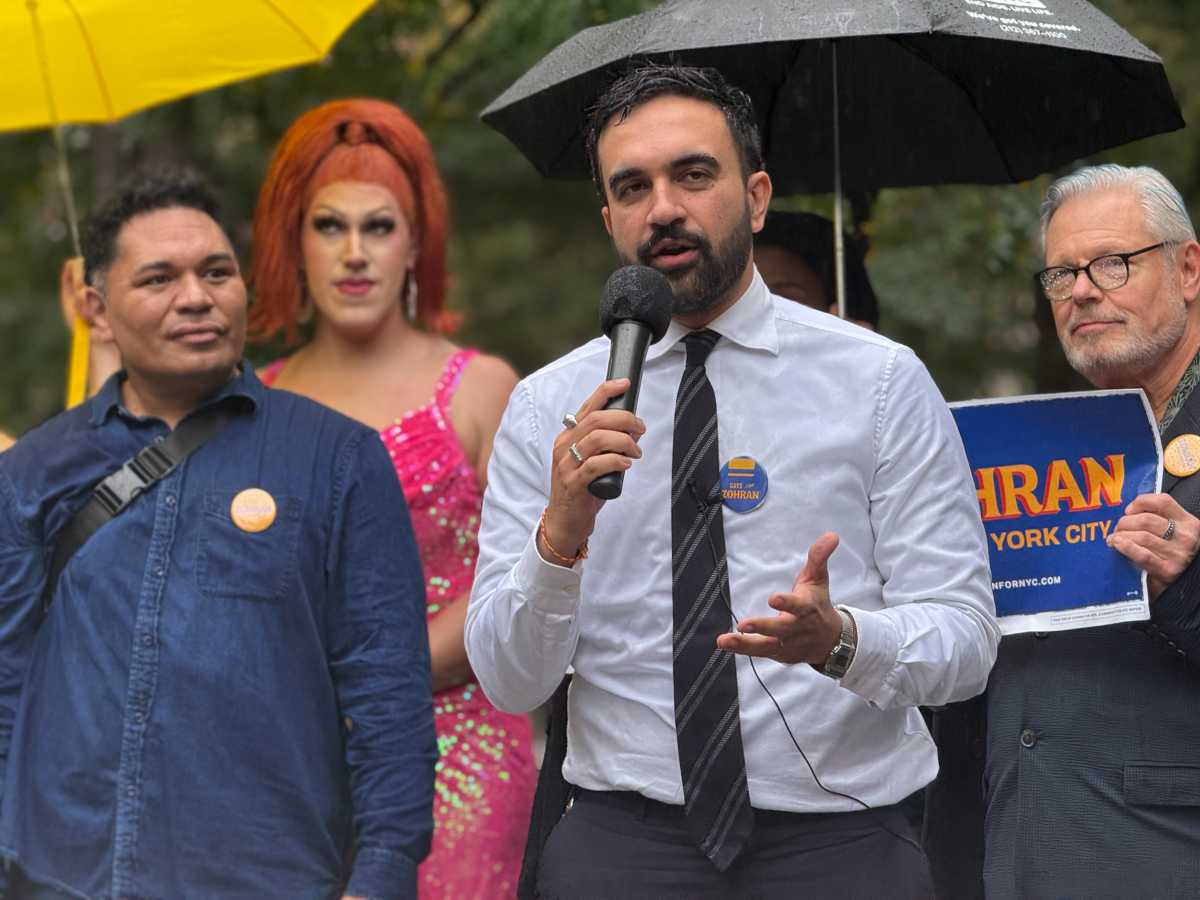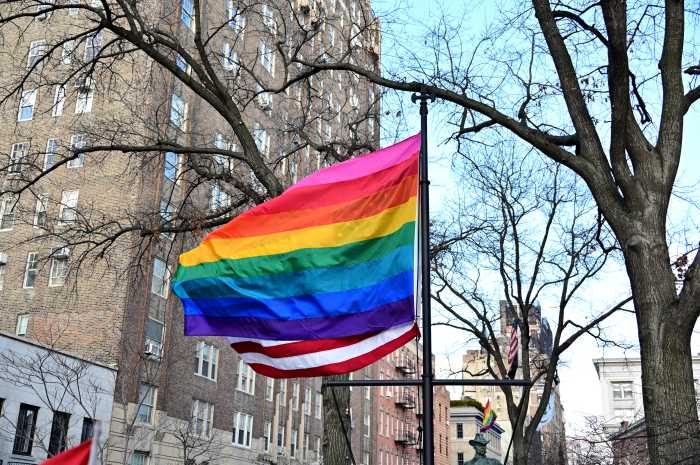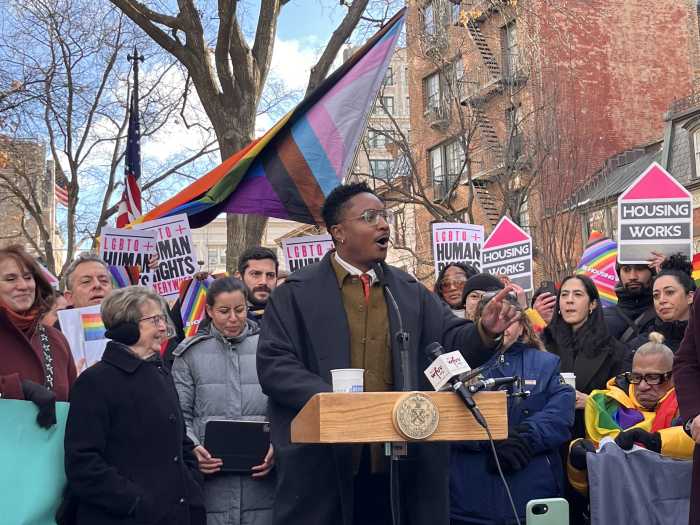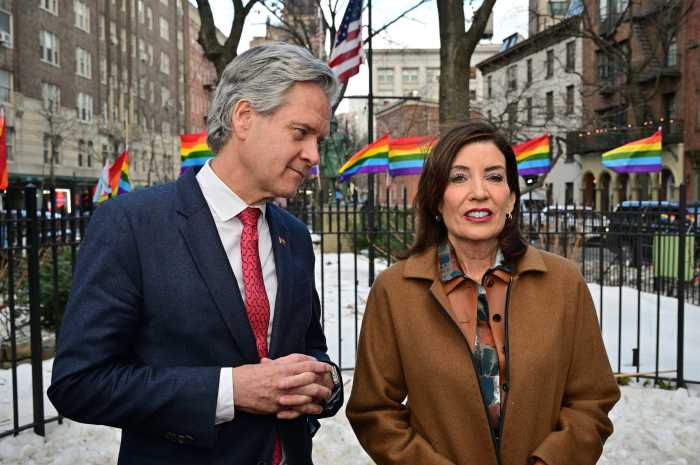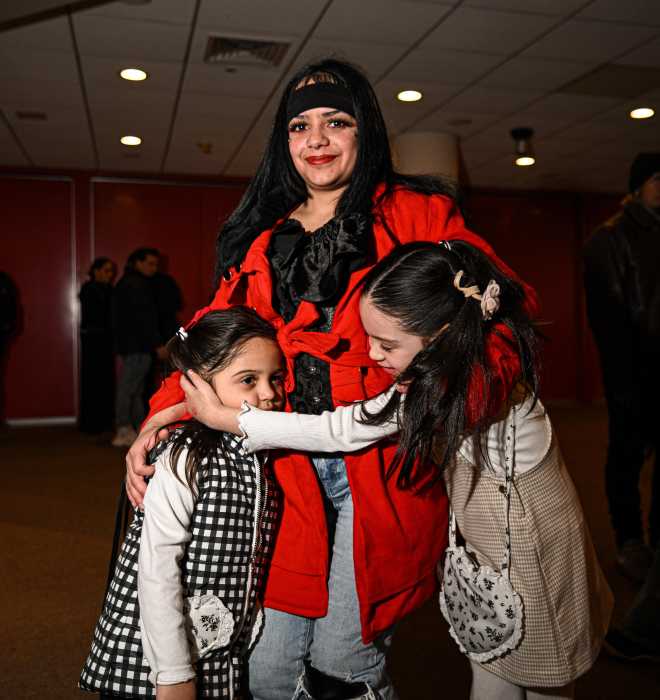A star-studded cast of queer New Yorkers, from world-famous actors and drag performers to LGBTQ grassroots activists, joined forces on Oct. 11, to celebrate National Coming Out Day and support the candidate for mayor who they contended will best represent the community’s needs, Democratic party nominee Zohran Mamdani.
The rally, which was organized by the volunteer-led group Gays for Zohran — which is unaffiliated with Mamdani’s campaign — drew hundreds of people who gathered at the foot of the AIDS Memorial in the West Village, entertained by performances by the drag performer Kiki Ball-Change and RuPaul’s Drag Race star Plasma.
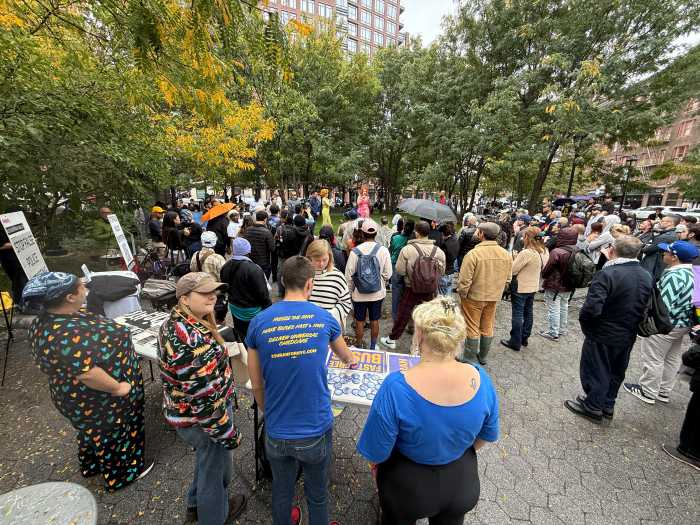
Many of the speakers at the rally, held on a day that commemorates the second National March on Washington for Lesbian and Gay Rights on Oct. 11, 1987, highlighted the challenges faced by queer people in New York and across the country to live their lives out and proud. They noted the increasingly hostile climate for queer people, with LGTBQ rights under constant attack by the Trump administration.
“We are here on National Coming Out Day in the rain, darling, because we are committed to a better New York,” said trans actress and LGBTQ activist Laverne Cox. “To the New York that I moved to with hopes and dreams over 30 years ago.”
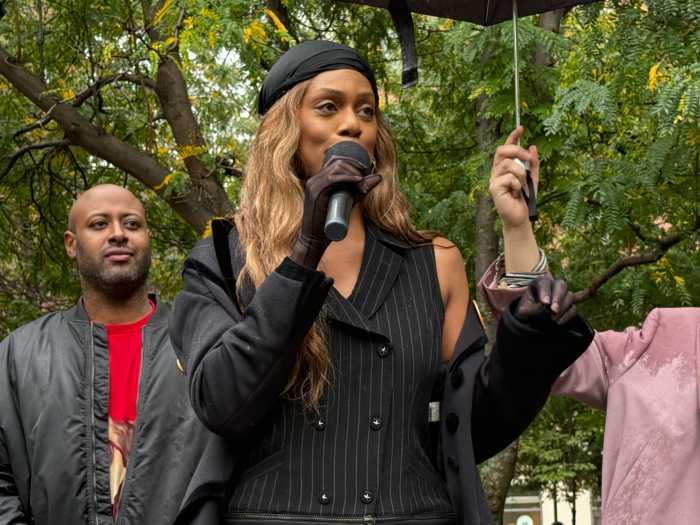
In a moving speech, Cox connected the importance of self-love and community to resisting anti-LGTBQ attacks and moving together with shared humanity.
“I have not been inspired to campaign for a politician in quite some time, but there is something about Zohran Mamdani that has made me come out, that has inspired me to believe that change is possible,” Cox said.
“I need you to be loud, proud, and awake, because what we’re talking about today isn’t just politics, it’s personal,” said drag performer and Drag Race star Brita Filter. “Coming out is something that we do every single day. Every time we walk down the street in full color when the world wants us in gray scale, every time we hold up someone’s hand in public, that’s coming out.”
“There are people in power that want to shove us back in the closet,” Brita Filter said. “But we don’t just disappear, girl. We turn up the volume.”
Mid-way through — and just as the rain was coming down at full-force — Mamdani himself rushed to the front of the crowd. Standing without an umbrella, he patiently waited for Plasma to perform a gag-worthy rendition of “New York, New York,” before speaking.
Mamdani told the crowd he strives to go beyond simply protecting LGBTQ New Yorkers.
“We have to recognize, we have to cherish — no longer can we simply talk of tolerance — we have to talk of belonging,” Mamdani said. “You all belong in this city, you have to be celebrated by it.”
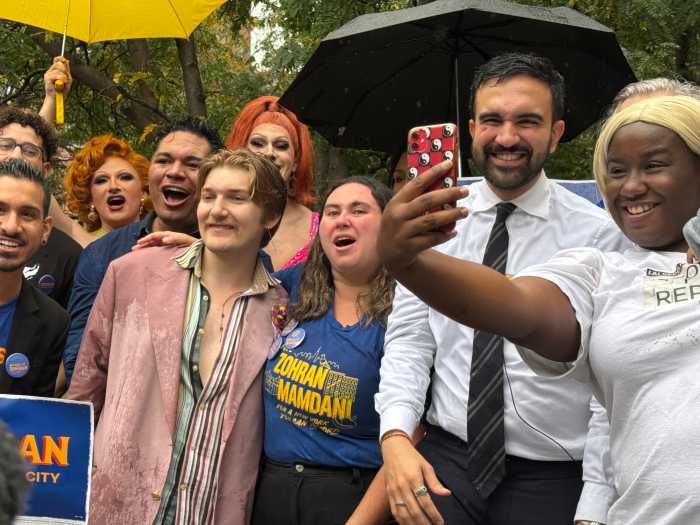
Mamdani’s campaign has presented three major proposals aimed at queer New Yorkers, including expanding gender-affirming care with $65 million in funding for public hospitals and community health providers, creating an office of LGBTQIA+ affairs, and making NYC a sanctuary city for LGBTQ people.
“We stand here in front of a memorial of what it looks like when the city, the state, and the nation betrays queer people,” Mamdani said, gesturing towards the triangular-shaped AIDS memorial. “Let us not create additional memorials [and] stand up for queer New Yorkers in their life and not just in their death.”
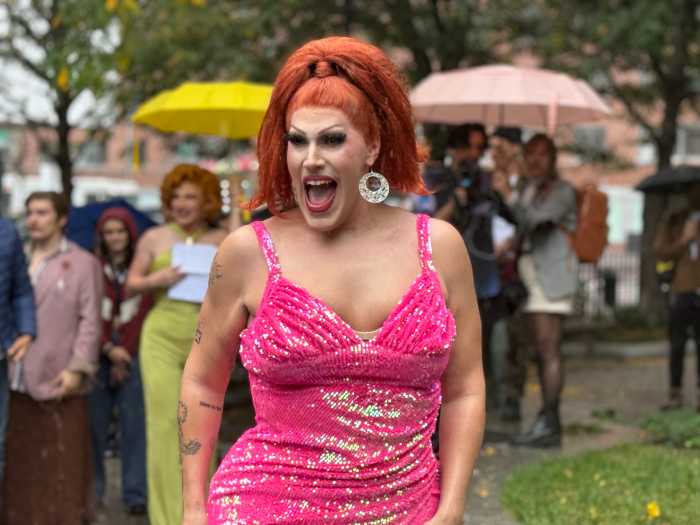
Mamdani’s message resonated with Lorelei Crean, a trans teenage activist and the lead organizer with the grassroots group New York City Youth for Trans Rights, who spoke about the Trump administration’s attacks on gender-affirming care.
“These constant attacks not only terrifies those who are out and are bearing the brunt of it, but it forces those still in the closet to remain there out of fear,” Crean said.
Crean, who turned 18 just in time to cast a ballot for the first time this November, supports Mamdani, they added, because “he was one of the only elected officials who came out in person to speak out against NYU Langone’s denial of life-saving gender-affirming care for minors.”
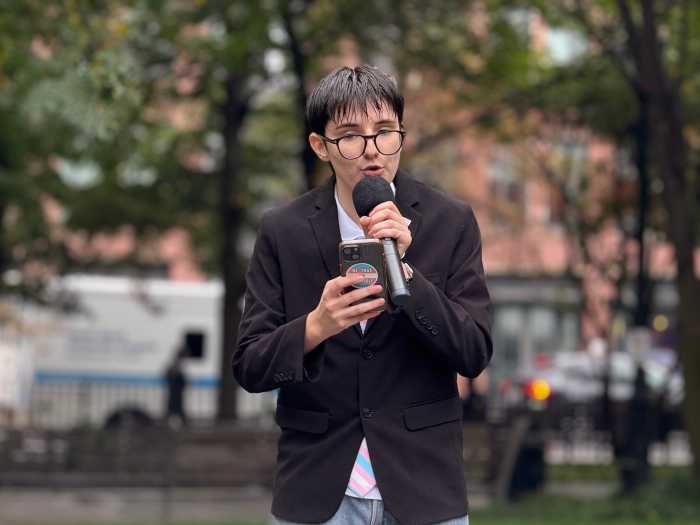
Other speakers addressed New York City’s affordability crisis.
“Without an affordable New York, there is no nightlife, no theater, no music, no art,” said Kiki Ball Change, who has worked as a drag performer in NYC for the past eight years.
“There is one thing that I believe is an unspoken issue that New Yorkers could see from miles away, the need for community,” said Plasma, who supports Mamdani for “not just holding fast to what he believes, but welcoming the challenge of expanding what that includes.”
Some activists, like Edafe Okporo, a gay Nigerian refugee and the executive director of Refuge America, committed to keep Mamdani accountable to queer, trans and immigrant communities should he be elected.
“When we go knock on doors to get people to elect him, we’re not doing it because we’re going to sleep tomorrow, but because we want to be a part of the conversation,” said Okporo, who mounted a bid for City Council earlier this year.
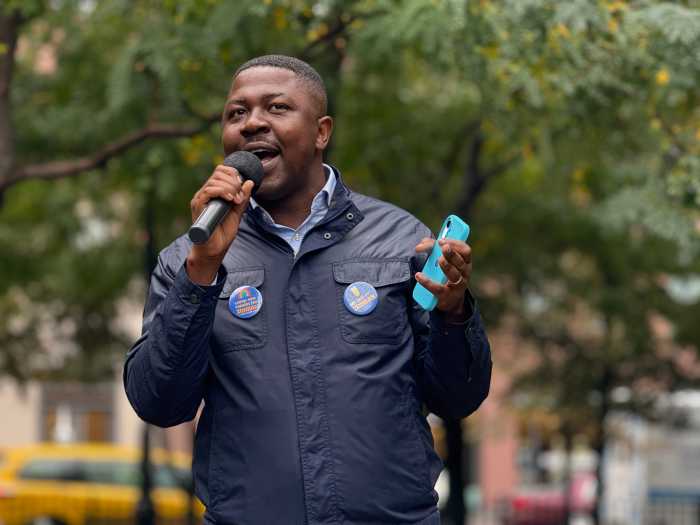
The rally was a resounding success for Gays for Zohran founder Katia Portela.
“I just feel so grateful that national figures and icons that people in our community look up to are ready to get involved and are ready for new leadership,” Portela told Gay City News. “I’ve never seen so much momentum from the LGBT community, and I just feel so hopeful.”
“It’s shades of the 2008 Obama campaign,” said Conor Mullen, who attended the rally with his partner Jimmy Lovett. “I feel like I really haven’t heard a politician talk about queer people the way Zohran Mamdani does.”
Mullen’s top concern in the election is the city’s overall affordability. “If a person gets kicked out of their job for being queer, are there supports in the city for that person?” he asked. “I think the disparity in wealth in this city divides, and Zohran is someone who is looking to make that smaller.”
New York City’s general election will take place on Tuesday, November 4, with early voting beginning on October 25.

